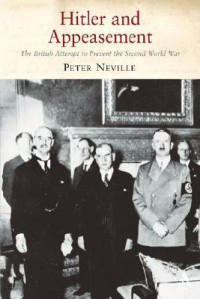A sympathetic reassessment of a failed policy

"Appeasement" is a word loaded with historical baggage -- specifically, its association with the failed efforts by the British and the French in the 1930s to avert war in Europe by accommodating Adolf Hitler's territorial demands. The effort, of course, was in vain, and when war came in 1939 Germany began it in a stronger position than they had been just a few years before, thanks in no small measure to the earlier concessions of his foes.
This failure to avert the war has been viewed ever since as the ultimate discrediting of appeasement as a policy, with its advocates viewed as fools or worse. Peter Neville takes exception to this view, however. Surveying the evolution of appeasement in the interwar period, he offers a sympathetic assessment of the situation policymakers faced and the decisions they made. He highlights the difficult choices facing British policymakers, with a multitude of vulnerabilities worldwide and few partners other than France (which itself was riven with problems) to help shoulder the load. Given the initial focus on bordering territory with ethnically German populations, appeasement was the best available option while the British rearmed their forces.
Neville is not uncritical of the decisions British politicians made, and he is particularly astute as to the personality clashes which often determined who exerted influence. He also incorporates appeasement's opponents into his analysis, showing how such esteemed figures as Winston Churchill were not always as hostile to the policy as they later sought to portray themselves as being. Overall it makes for a provocative reassessment of what remains an extraordinarily controversial period in history, one that helps us to better understand the choices people made and why it was that they failed in their goals.
 4
4






